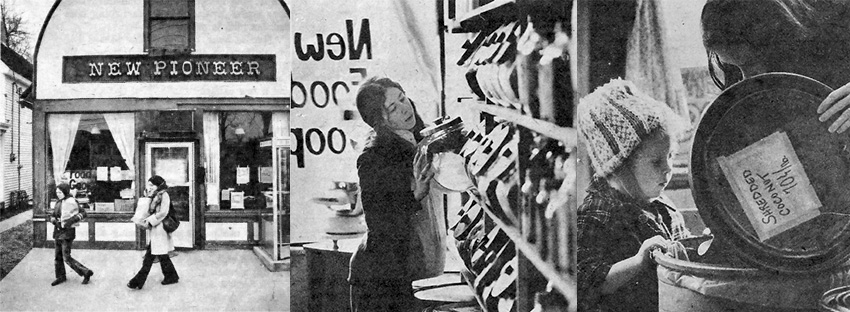From the Blog
Sustainable From the Start

"We were looking for foods in their more natural state,"
said Theresa Carbrey, one of the co-op's founders and the former member services and education coordinator.
"It was the view of the group that we are part of nature... for us to have natural vigor and health, we needed to look for food sources that were in their natural state- not refined, processed, or chemically preserved, or hydrogenated."
Before long, the group had grown to 40 to 50 people.
"Suddenly, the idea just really caught on and everybody wanted these products that were not really available anywhere else,"
Carbrey said.
Early offerings focused on bulk buys. There were a lot of herbs and spices, grains, beans, peanut butter, dried fruits and good-quality oils. People would bring their own bins and jars to take the food home.
Even with people excited to eat healthier, the group realized that some education was needed.
"You might eat wheat bread every day, but you've never seen a wheat berry. It looks like something a horse would eat," Carbrey said.
Co-op members who volunteered in the store would educate shoppers, trade recipes, and offer ideas for how to live more sustainably.
Carbrey said that a big push early on was promoting local food sourcing, because food that travels long distances is expensive and the trucks that ship it burn fossil fuels. It also creates a fragile food economy.
"In Iowa, we grow lots of corn and beans and beef, but most of our food is being shipped in. So we can make an environmental impact by supporting our local food sources. New Pioneer has really been a leader in that,"
she said.
New Pi has now grown to three locations: Iowa City, Coralville and Cedar Rapids. In addition to its traditional bulk offerings, New Pi's stores also source from local beekeepers, coffee roasters, bakers and farmers. Items that can't be found locally are ethically sourced.
"Food doesn't just come out of the sky," Carbrey said. "There is soil and there are humans that set my table. And I have an obligation to them to see that they have a good life."
New Pi prioritizes local vendors (those within 250 miles of the stores) and organic foods. Nearly 100,000 gallons of food waste is converted into compost and diverted from the landfill each year.
"Sustainability is such a part of our DNA, it's baked into almost every aspect of our product selection and the way we run our business."
said Amy Hospodarsky, brand manager for New Pi.
New Pi stopped using plastic bags in 2015 and instead uses paper bags. Customers can also bring their own bags. Hospodarsky estimates that 1.25 million plastic bags have been diverted from the landfill as a result.
Biodegradable packaging is used as often as possible. Customers also have the option of doing low- to zero-waste shopping; for example, the meat department will pack food in personal containers.
"Our customers really want access to that type of thing to lower their own footprint," Hospodarsky said.
While New Pi started off as a way to be good stewards of the land and promote clean and healthy eating, "we've added all these other things over the years as we've learned about our environmental impact," Hospodarsky said.
For seven years, New Pi hosted Earth Source Gardens, which members harvested together, and held gardening classes. New Pi also helped found groups like Table to Table, which rescues nearly 80,000 pounds of edible Co-op food each year and distributes it to food-insecure people in the Corridor.
"This was all in keeping with New Pioneer's larger picture of being sustainable, being a responsible member of the community and putting people and the environment first, Carbrey said.
"It's just been a very progressive, satisfying, delicious, economically rewarding kind of vision of sustainability."
